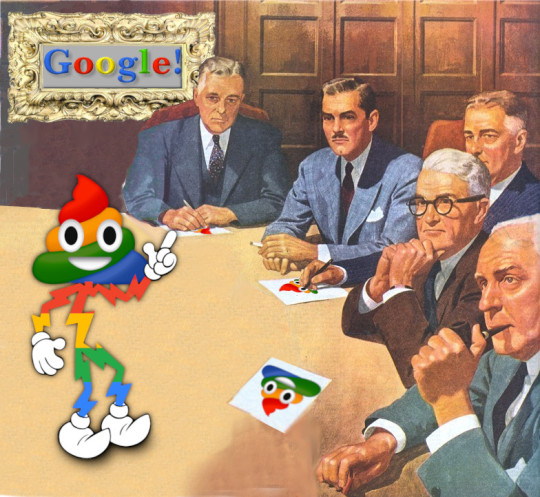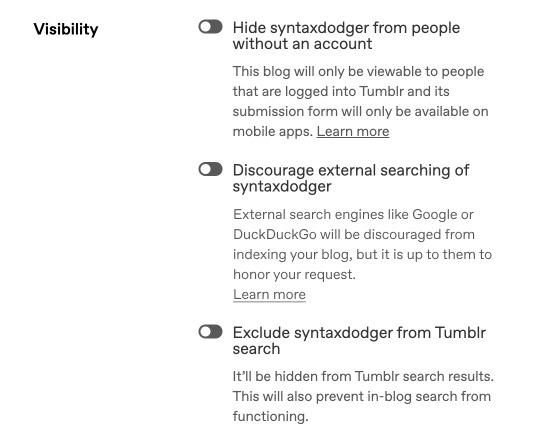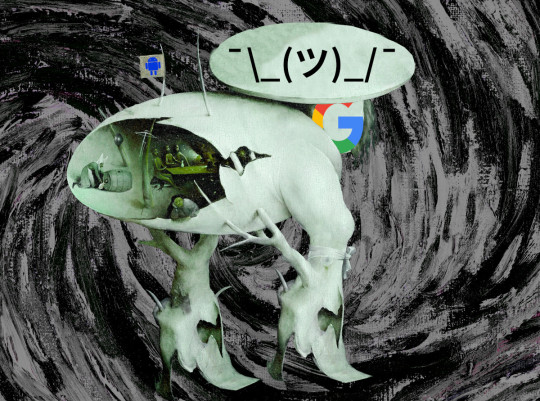#Search
Text
The specific process by which Google enshittified its search

I'm touring my new, nationally bestselling novel The Bezzle! Catch me SATURDAY (Apr 27) in MARIN COUNTY, then Winnipeg (May 2), Calgary (May 3), Vancouver (May 4), and beyond!

All digital businesses have the technical capacity to enshittify: the ability to change the underlying functions of the business from moment to moment and user to user, allowing for the rapid transfer of value between business customers, end users and shareholders:
https://pluralistic.net/2023/02/19/twiddler/
If you'd like an essay-formatted version of this thread to read or share, here's a link to it on pluralistic.net, my surveillance-free, ad-free, tracker-free blog:
https://pluralistic.net/2024/04/24/naming-names/#prabhakar-raghavan
Which raises an important question: why do companies enshittify at a specific moment, after refraining from enshittifying before? After all, a company always has the potential to benefit by treating its business customers and end users worse, by giving them a worse deal. If you charge more for your product and pay your suppliers less, that leaves more money on the table for your investors.
Of course, it's not that simple. While cheating, price-gouging, and degrading your product can produce gains, these tactics also threaten losses. You might lose customers to a rival, or get punished by a regulator, or face mass resignations from your employees who really believe in your product.
Companies choose not to enshittify their products…until they choose to do so. One theory to explain this is that companies are engaged in a process of continuous assessment, gathering data about their competitive risks, their regulators' mettle, their employees' boldness. When these assessments indicate that the conditions are favorable to enshittification, the CEO walks over to the big "enshittification" lever on the wall and yanks it all the way to MAX.
Some companies have certainly done this – and paid the price. Think of Myspace or Yahoo: companies that made themselves worse by reducing quality and gouging on price (be it measured in dollars or attention – that is, ads) before sinking into obscure senescence. These companies made a bet that they could get richer while getting worse, and they were wrong, and they lost out.
But this model doesn't explain the Great Enshittening, in which all the tech companies are enshittifying at the same time. Maybe all these companies are subscribing to the same business newsletter (or, more likely, buying advice from the same management consultancy) (cough McKinsey cough) that is a kind of industry-wide starter pistol for enshittification.
I think it's something else. I think the main job of a CEO is to show up for work every morning and yank on the enshittification lever as hard as you can, in hopes that you can eke out some incremental gains in your company's cost-basis and/or income by shifting value away from your suppliers and customers to yourself.
We get good digital services when the enshittification lever doesn't budge – when it is constrained: by competition, by regulation, by interoperable mods and hacks that undo enshittification (like alternative clients and ad-blockers) and by workers who have bargaining power thanks to a tight labor market or a powerful union:
https://pluralistic.net/2023/11/09/lead-me-not-into-temptation/#chamberlain
When Google ordered its staff to build a secret Chinese search engine that would censor search results and rat out dissidents to the Chinese secret police, googlers revolted and refused, and the project died:
https://en.wikipedia.org/wiki/Dragonfly_(search_engine)
When Google tried to win a US government contract to build AI for drones used to target and murder civilians far from the battlefield, googlers revolted and refused, and the project died:
https://www.nytimes.com/2018/06/01/technology/google-pentagon-project-maven.html
What's happened since – what's behind all the tech companies enshittifying all at once – is that tech worker power has been smashed, especially at Google, where 12,000 workers were fired just months after a $80b stock buyback that would have paid their wages for the next 27 years. Likewise, competition has receded from tech bosses' worries, thanks to lax antitrust enforcement that saw most credible competitors merged into behemoths, or neutralized with predatory pricing schemes. Lax enforcement of other policies – privacy, labor and consumer protection – loosened up the enshittification lever even more. And the expansion of IP rights, which criminalize most kinds of reverse engineering and aftermarket modification, means that interoperability no longer applies friction to the enshittification lever.
Now that every tech boss has an enshittification lever that moves very freely, they can show up for work, yank the enshittification lever, and it goes all the way to MAX. When googlers protested the company's complicity in the genocide in Gaza, Google didn't kill the project – it mass-fired the workers:
https://medium.com/@notechforapartheid/statement-from-google-workers-with-the-no-tech-for-apartheid-campaign-on-googles-indiscriminate-28ba4c9b7ce8
Enshittification is a macroeconomic phenomenon, determined by the regulatory environment for competition, privacy, labor, consumer protection and IP. But enshittification is also a microeconomic phenomenon, the result of innumerable boardroom and product-planning fights within companies in which would-be enshittifiers try to do things that make the company's products and services shittier wrestle with rivals who want to keep things as they are, or make them better, whether out of principle or fear of the consequences.
Those microeconomic wrestling-matches are where we find enshittification's heroes and villains – the people who fight for the user or stand up for a fair deal, versus the people who want to cheat and wreck to make things better for the company and win bonuses and promotions for themselves:
https://locusmag.com/2023/11/commentary-by-cory-doctorow-dont-be-evil/
These microeconomic struggles are usually obscure, because companies are secretive institutions and our glimpses into their deliberations are normally limited to the odd leaked memo, whistleblower tell-all, or spectacular worker revolt. But when a company gets dragged into court, a new window opens into the company's internal operations. That's especially true when the plaintiff is the US government.
Which brings me back to Google, the poster-child for enshittification, a company that revolutionized the internet a quarter of a century ago with a search-engine that was so good that it felt like magic, which has decayed so badly and so rapidly that whole sections of the internet are disappearing from view for the 90% of users who rely on the search engine as their gateway to the internet.
Google is being sued by the DOJ's Antitrust Division, and that means we are getting a very deep look into the company, as its internal emails and memos come to light:
https://pluralistic.net/2023/10/03/not-feeling-lucky/#fundamental-laws-of-economics
Google is a tech company, and tech companies have literary cultures – they run on email and other forms of written communication, even for casual speech, which is more likely to take place in a chat program than at a water-cooler. This means that tech companies have giant databases full of confessions to every crime they've ever committed:
https://pluralistic.net/2023/09/03/big-tech-cant-stop-telling-on-itself/
Large pieces of Google's database-of-crimes are now on display – so much, in fact, that it's hard for anyone to parse through it all and understand what it means. But some people are trying, and coming up with gold. One of those successful prospectors is Ed Zitron, who has produced a staggering account of the precise moment at which Google search tipped over into enshittification, which names the executives at the very heart of the rot:
https://www.wheresyoured.at/the-men-who-killed-google/
Zitron tells the story of a boardroom struggle over search quality, in which Ben Gomes – a long-tenured googler who helped define the company during its best years – lost a fight with Prabhakar Raghavan, a computer scientist turned manager whose tactic for increasing the number of search queries (and thus the number of ads the company could show to searchers) was to decrease the quality of search. That way, searchers would have to spend more time on Google before they found what they were looking for.
Zitron contrasts the background of these two figures. Gomes, the hero, worked at Google for 19 years, solving fantastically hard technical scaling problems and eventually becoming the company's "search czar." Raghavan, the villain, "failed upwards" through his career, including a stint as Yahoo's head of search from 2005-12, a presiding over the collapse of Yahoo's search business. Under Raghavan's leadership, Yahoo's search market-share fell from 30.4% to 14%, and in the end, Yahoo jettisoned its search altogether and replaced it with Bing.
For Zitron, the memos show how Raghavan engineered the ouster of Gomes, with help from the company CEO, the ex-McKinseyite Sundar Pichai. It was a triumph for enshittification, a deliberate decision to make the product worse in order to make it more profitable, under the (correct) belief that the company's exclusivity deals to provide search everywhere from Iphones and Samsungs to Mozilla would mean that the business would face no consequences for doing so.
It a picture of a company that isn't just too big to fail – it's (as FTC Chair Lina Khan put it on The Daily Show) too big to care:
https://www.youtube.com/watch?v=oaDTiWaYfcM
Zitron's done excellent sleuthing through the court exhibits here, and his writeup is incandescently brilliant. But there's one point I quibble with him on. Zitron writes that "It’s because the people running the tech industry are no longer those that built it."
I think that gets it backwards. I think that there were always enshittifiers in the C-suites of these companies. When Page and Brin brought in the war criminal Eric Schmidt to run the company, he surely started every day with a ritual, ferocious tug at that enshittification lever. The difference wasn't who was in the C-suite – the difference was how freely the lever moved.
On Saturday, I wrote:
The platforms used to treat us well and now treat us badly. That's not because they were setting a patient trap, luring us in with good treatment in the expectation of locking us in and turning on us. Tech bosses do not have the executive function to lie in wait for years and years.
https://pluralistic.net/2024/04/22/kargo-kult-kaptialism/#dont-buy-it
Someone on Hacker News called that "silly," adding that "tech bosses do in fact have the executive function to lie in wait for years and years. That's literally the business model of most startups":
https://news.ycombinator.com/item?id=40114339
That's not quite right, though. The business-model of the startup is to yank on the enshittification lever every day. Tech bosses don't lie in wait for the perfect moment to claw away all the value from their employees, users, business customers, and suppliers – they're always trying to get that value. It's only when they become too big to care that they succeed. That's the definition of being too big to care.
In antitrust circles, they sometimes say that "the process is the punishment." No matter what happens to the DOJ's case against Google, its internal workers have been made visible to the public. The secrecy surrounding the Google trial when it was underway meant that a lot of this stuff flew under the radar when it first appeared. But as Zitron's work shows, there is plenty of treasure to be found in that trove of documents that is now permanently in the public domain.
When future scholars study the enshittocene, they will look to accounts like Zitron's to mark the turning points from the old, good internet to the enshitternet. Let's hope those future scholars have a new, good internet on which to publish their findings.

If you'd like an essay-formatted version of this post to read or share, here's a link to it on pluralistic.net, my surveillance-free, ad-free, tracker-free blog:
https://pluralistic.net/2024/04/24/naming-names/#prabhakar-raghavan
#pluralistic#ed zitron#google#microincentives#constraints#enshittification#rot economy#platform decay#search#ben gomes#code yellow#mckinsey#hacking engagement#Prabhakar Raghavan#yahoo#doj#antitrust#trustbusting
326 notes
·
View notes
Text
how to have any form of connection with anyone not feel performative
#search#lana del rey#starabxlla#girlblogging#this is a girlblog#gaslight gatekeep girlblog#literature#just girlboss things#lana del ray aka lizzy grant#it girl#girl interrupted#girlcore#manic pixie dream girl#girlblogger#girlblog aesthetic#live laugh girlblog#hell is a teenage girl#gaslight gatekeep girlboss#girl blogger#femcel#lizzy grant#dirty coquette#girly stuff
17 notes
·
View notes
Photo

Late night searches. A fear submitted by Jackie to Deep Dark Fears - thanks!
You can find original art in my shop!
#comics#Deep Dark Fears#DeepDarkFears#scary movies#fear#scary#sketch#sketchbook#art#illustration#watercolor#nightmares#nightmare#phone#search#mania
8K notes
·
View notes
Note
I recently encountered yet another tumblr user who didn't realize that the Blog Settings option to hide your blog from search engines also includes tumblr's own search. It's surprisingly common in my experience, where people for years complain that search is broken for their blog, or that their posts don't show up in the public tags/search, but have no idea it was their own choice that put them in that situation. I know that the explainer text for the "discourage searching of [blog]" option is definitely more detailed than it used be, but if you haven't checked your settings since then, well...
Anyway, is it possible that the option could be separated into "hide from external search engines" and "hide from tumblr's search"? For people who would prefer not to be googleable (and assumed that's the only thing the option was doing) but are ok with their posts showing up in tumblr's own search.
Or possibly the options could be "hide from external search engines" and "turn off tumblr search for my blog"? Or at the very least, could there be further explainer text that hiding your from tumblr's search means that your blog's own searchbar won't ever find anything?
Answer: Hello, @nobodysuspectsthebutterfly!
Well, what do you know. We were looking at this same issue just recently and could not agree more: this setting really should be separated. Ideally, it would look a little something like this:

We need to take another look at this, as splitting search settings into Tumblrs vs. others makes a whole lot of sense. What is less clear is when a member of the team will have the capacity to work on it.
But rest assured we will be adding this to our agenda, and will be in touch with you with updates as and when we have them. And we hope you do not have to wait too long for news on this. We’ll keep you posted!
2K notes
·
View notes
Text




La bête dans la jungle (Patric Chiha, 2023)
#La bête dans la jungle#The Beast in the Jungle#Patric Chiha#La bete dans la jungle#2023#quote#Anaïs Demoustier#Anais Demoustier#Tom Mercier#death#memory#past#search#feet#shoes
385 notes
·
View notes
Text

Windows Vista - imageres.dll, icon 18
162 notes
·
View notes
Text
oh, you like the idea of zolu or find the fancontent cute but can't bring yourself to ship it because you HC Luffy to be aroace? (ignoring that asexuality and aromantisism exist on a spectrum. and that QPR's/relationship anarachy are a thing). should we tell everyone??? should we throw a fucking party???
#I'm sick of seeing SO MANY posts like this#like. if you don't ship them! that's completely fine! good for you even I'm glad you are enjoying fandom in the way that makes you happiest#but why do so many ppl feel the need to make some variation of this post and not even censor it or anything so it doesn't show up in tag#search#like putting your personal opinions on your personal blog is completely understandable and fair! but it's just courtesy to make sure it#isn't searchable to people who just wanna scroll for that ships content#istg it's mainly zolu that gets this as well#which is so baffling to me because they are such an aroace coded and unconventional ship#like we ain't even doing that much extra stuff we're just observing canon 😭 it's not out fault it's like that and we have eyes#psii.txt#text#discourse
170 notes
·
View notes
Text

My goodness!!!
#incel#violence against black women#violence against black girls#Samyia Spain#brooklyn#new york#deli#stabbing#twin sisters#veo kelly#park slope#assault#murder#criminal possession of a weapon#rejection#aggression#tragedy#violence#investigation#search#criminal history#robbery charges#community reaction#vigil#grieving father#women's safety#pressure to give phone numbers#public gathering place#neighborhood impact#emotional toll
130 notes
·
View notes
Text


Simple & Clean
Theme 2 Revamp by @eossa
A super minimal theme for your blog. Updated version of the revamp, now supports both NPF and legacy style posts.
Some features: Sidebar, one column, pagination, search, custom links, updates tab, dark mode, and many more!
Previews: Live (legacy) + Static (NPF)
Want to know more? Here's the guide.
Want this theme? Get it here: buymeacoffee | ko-fi | payhip
#eossa#userthmrec#aidpaidcontent#tumblr theme#theme maker#responsive#minimal#full npf support#dark mode#1c#sidebar#search#updates tab#overlay#price: prm#blog#my codes#my themes#theme 2#t2 simple and clean#revamp
62 notes
·
View notes
Text
Search GDA by era

Search

Search

Search

Search

Search

Search

Search

Search

Search

Search

Search
Search by side project

Search

Search

Search

Search
Other

Search
78 notes
·
View notes
Text
Too big to care

I'm on tour with my new, nationally bestselling novel The Bezzle! Catch me in BOSTON with Randall "XKCD" Munroe (Apr 11), then PROVIDENCE (Apr 12), and beyond!

Remember the first time you used Google search? It was like magic. After years of progressively worsening search quality from Altavista and Yahoo, Google was literally stunning, a gateway to the very best things on the internet.
Today, Google has a 90% search market-share. They got it the hard way: they cheated. Google spends tens of billions of dollars on payola in order to ensure that they are the default search engine behind every search box you encounter on every device, every service and every website:
https://pluralistic.net/2023/10/03/not-feeling-lucky/#fundamental-laws-of-economics
Not coincidentally, Google's search is getting progressively, monotonically worse. It is a cesspool of botshit, spam, scams, and nonsense. Important resources that I never bothered to bookmark because I could find them with a quick Google search no longer show up in the first ten screens of results:
https://pluralistic.net/2024/02/21/im-feeling-unlucky/#not-up-to-the-task
Even after all that payola, Google is still absurdly profitable. They have so much money, they were able to do a $80 billion stock buyback. Just a few months later, Google fired 12,000 skilled technical workers. Essentially, Google is saying that they don't need to spend money on quality, because we're all locked into using Google search. It's cheaper to buy the default search box everywhere in the world than it is to make a product that is so good that even if we tried another search engine, we'd still prefer Google.
This is enshittification. Google is shifting value away from end users (searchers) and business customers (advertisers, publishers and merchants) to itself:
https://pluralistic.net/2024/03/05/the-map-is-not-the-territory/#apor-locksmith
And here's the thing: there are search engines out there that are so good that if you just try them, you'll get that same feeling you got the first time you tried Google.
When I was in Tucson last month on my book-tour for my new novel The Bezzle, I crashed with my pals Patrick and Teresa Nielsen Hayden. I've know them since I was a teenager (Patrick is my editor).
We were sitting in his living room on our laptops – just like old times! – and Patrick asked me if I'd tried Kagi, a new search-engine.
Teresa chimed in, extolling the advanced search features, the "lenses" that surfaced specific kinds of resources on the web.
I hadn't even heard of Kagi, but the Nielsen Haydens are among the most effective researchers I know – both in their professional editorial lives and in their many obsessive hobbies. If it was good enough for them…
I tried it. It was magic.
No, seriously. All those things Google couldn't find anymore? Top of the search pile. Queries that generated pages of spam in Google results? Fucking pristine on Kagi – the right answers, over and over again.
That was before I started playing with Kagi's lenses and other bells and whistles, which elevated the search experience from "magic" to sorcerous.
The catch is that Kagi costs money – after 100 queries, they want you to cough up $10/month ($14 for a couple or $20 for a family with up to six accounts, and some kid-specific features):
https://kagi.com/settings?p=billing_plan&plan=family
I immediately bought a family plan. I've been using it for a month. I've basically stopped using Google search altogether.
Kagi just let me get a lot more done, and I assumed that they were some kind of wildly capitalized startup that was running their own crawl and and their own data-centers. But this morning, I read Jason Koebler's 404 Media report on his own experiences using it:
https://www.404media.co/friendship-ended-with-google-now-kagi-is-my-best-friend/
Koebler's piece contained a key detail that I'd somehow missed:
When you search on Kagi, the service makes a series of “anonymized API calls to traditional search indexes like Google, Yandex, Mojeek, and Brave,” as well as a handful of other specialized search engines, Wikimedia Commons, Flickr, etc. Kagi then combines this with its own web index and news index (for news searches) to build the results pages that you see. So, essentially, you are getting some mix of Google search results combined with results from other indexes.
In other words: Kagi is a heavily customized, anonymized front-end to Google.
The implications of this are stunning. It means that Google's enshittified search-results are a choice. Those ad-strewn, sub-Altavista, spam-drowned search pages are a feature, not a bug. Google prefers those results to Kagi, because Google makes more money out of shit than they would out of delivering a good product:
https://www.theverge.com/2024/4/2/24117976/best-printer-2024-home-use-office-use-labels-school-homework
No wonder Google spends a whole-ass Twitter every year to make sure you never try a rival search engine. Bottom line: they ran the numbers and figured out their most profitable course of action is to enshittify their flagship product and bribe their "competitors" like Apple and Samsung so that you never try another search engine and have another one of those magic moments that sent all those Jeeves-askin' Yahooers to Google a quarter-century ago.
One of my favorite TV comedy bits is Lily Tomlin as Ernestine the AT&T operator; Tomlin would do these pitches for the Bell System and end every ad with "We don't care. We don't have to. We're the phone company":
https://snltranscripts.jt.org/76/76aphonecompany.phtml
Speaking of TV comedy: this week saw FTC chair Lina Khan appear on The Daily Show with Jon Stewart. It was amazing:
https://www.youtube.com/watch?v=oaDTiWaYfcM
The coverage of Khan's appearance has focused on Stewart's revelation that when he was doing a show on Apple TV, the company prohibited him from interviewing her (presumably because of her hostility to tech monopolies):
https://www.thebignewsletter.com/p/apple-got-caught-censoring-its-own
But for me, the big moment came when Khan described tech monopolists as "too big to care."
What a phrase!
Since the subprime crisis, we're all familiar with businesses being "too big to fail" and "too big to jail." But "too big to care?" Oof, that got me right in the feels.
Because that's what it feels like to use enshittified Google. That's what it feels like to discover that Kagi – the good search engine – is mostly Google with the weights adjusted to serve users, not shareholders.
Google used to care. They cared because they were worried about competitors and regulators. They cared because their workers made them care:
https://www.vox.com/future-perfect/2019/4/4/18295933/google-cancels-ai-ethics-board
Google doesn't care anymore. They don't have to. They're the search company.

If you'd like an essay-formatted version of this post to read or share, here's a link to it on pluralistic.net, my surveillance-free, ad-free, tracker-free blog:
https://pluralistic.net/2024/04/04/teach-me-how-to-shruggie/#kagi
#pluralistic#john stewart#the daily show#apple#monopoly#lina khan#ftc#too big to fail#too big to jail#monopolism#trustbusting#antitrust#search#enshittification#kagi#google
434 notes
·
View notes
Text
I swear we need a search engine and/or website specifically made for neurodivergent people, by neurodivergent people. I'm tired of looking up online browser games for stimming and getting Autism Mom sob stories or Autism Speaks commercials...
#lgbtq#aroace#autism#autistic#neurodivergent#adhd#actually neurodivergent#neurodiversity#neurodiverse stuff#website#search#actually disabled#disability#disabled#chronic disability#disabilties#lgbtqia#lgbtq community#lgbt pride#queer community#pride#queer
57 notes
·
View notes
Note
I was recently given this sticker from my partner, we haven't been able to figure out where or what it's from anywhere. I love the design of it & it fits the style of your blog so well so I'm sharing in hopes that someone here possibly recognizes it and maybe we can finally get some answers!! If this kind of ask isn't ok I apologize, just been a fan for awhile and figured this may be my best bet. Thank you so much !!!

No worries I’m very invested in this mystery too now 😂 I looked at as many Sanrio characters as I could and other Japanese frog characters (I assume they’re a frog cause of the tadpoles.) I hope one of you know, and good luck Plushbuggy! Thanks for the kind words :)
75 notes
·
View notes
Note
Hi! The option to embed Tweets, that automatically adds alt text, is very practical, and I seriously appreciate it. It has some imperfections though, such as not including the text of the quoted Tweet (when applicable) or, when the Tweet includes an image that itself has alt text, not including said alt text. Is it technically possible to add these functions in the future?
Answer: Hey there, @aseriesofunfortunatejan!
We’d love to improve the alt text we add to embedded Tweets! Unfortunately, we’re only able to use the text that Twitter sends us through their oEmbed API, and they don’t include the text of quoted tweets—or the alt text of images in the Tweet.
Over on WordPress.com, we used to have a more powerful Twitter integration: we were experimenting with using it to improve Tweet embeds on Tumblr. Sadly, Twitter decided to start charging everyone prohibitively large fees to access their API in this way, which meant we had to shut it all down. It’s the same reason we had to shut down sharing to Twitter from Tumblr, too.
We’re eternal optimists, so we’ve built Tweet embedding to be pretty flexible. Should Twitter ever decide to expand the text that they send us, we’ll start using it automatically.
88 notes
·
View notes
Text
Looking for peace 🐚 !.
#Peace#Life#Search#Part#Mood#Night#Vibes#downfalldestiny#downfall#life#magic destinations#magical world#magic moments
99 notes
·
View notes
